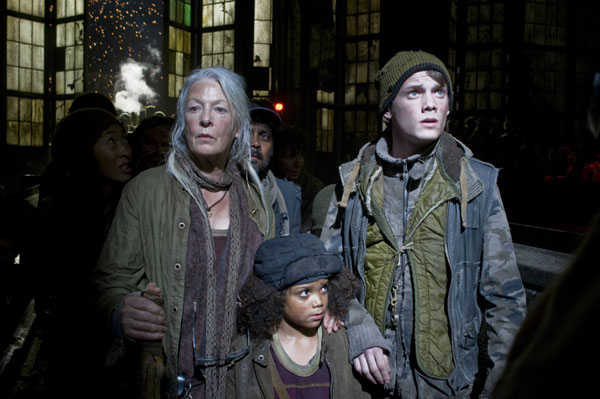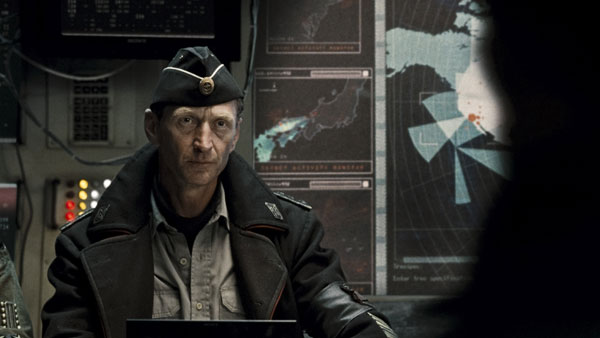
After premiering on May 21 2009, the movie "Terminator: Salvation" was met with a generally positive audience response and successfully continues that long running "Terminator" franchise that started in 1984. My review on how i felt about the film, its philosophical themes or its shaky cinematography would not be the focus of this post. However, I would like to bring your attention to one of the sub plots of the movie that involves the chain of command of the Resistance army that are waging a guerrilla war against a self-aware Artificial intelligence(A.I) program bent on total destruction of humankind.
A little bit of back history of the movie for those unfamiliar with its premise.
In the early 21s century, a military A.I program called "Skynet" became self-aware and logically concluded that humans were a threat to it. It managed to cause a global nuclear war that decimated three quarters of the earth. Fast forward to the year 2018 and a fully functional human Resistance movement has been formed. Among its soldiers is one John Connor; a lowly platoon commander rapidly gaining a loyal underground following among the human population. He exhibits a uncanny knowledge of the machine's tactics and weaknesses, thanks to past experience with time-traveling cyborgs, making many of the survivors perceive him as some sort of "prophet" or "savior". He reached out to the scattered pockets of resistance via nightly radio broadcasts, in a way reducing temporal proximity and allowing him to form relationships with the various scattered groups.

Need for support and synergy was the core factor that most likely brought the Resistance movement together. It was established in the movie that there were many different pockets of guerrilla fighters at first, and that they came together to form the Resistance movement under a central command. The benefits of coming together as one cohesive unit instead of a bunch of scattered squads are the same with any group coming together in the first place. To benefit from each other(group synergy), to gain support from each other and to meet interpersonal needs like companionship in a post apocalyptic world ruled by machines. As for the five generals who make up the Resistance central command, they got together as it is easier to tackle complex decisions as a group and it was easier to coordinate their individual armies.

In the film, the decision is made by the Resistance commanders to launch a full scale attack on Skynet installations following the discovery of an electronic frequency that may shut down the machines.

However, despite knowing that there are thousands of human captives in such installation, the generals all agree to launch the attacks.
There is evidence of "Group think" at play in making that decision. For one thing, the generals believed strongly in the applied morality of their group, in that it was right to destroy the captives along with Skynet, so long as the goal of victory is met. They collectively rationalized that the ends justified the means and that the deaths of the captives was an acceptable loss.
One general was reluctant, a dissenter, at first but had to give in to the decision due to group pressure, leading to the illusion that the decision was unanimous.

Connor objected; he blatantly went against the decision of the group as the group's needs were not the same as his needs, which was to rescue the captives before the attack was launched, thus preserving human lives.

This led to a breakdown in the group communication as Connor did not conform to the ideals of the other leaders. However, due to his reaching out and establishing relationships with the majority of the world-wide human resistance, the majority of the soldiers went with Connor's decision and assisted in the rescue of the captives.
I am certain many of us face this sort of situation in life. When the group we are in makes a decision that you do not agree with but are forced to agree since you are part of that group. How far would one be willing to conform despite knowing that what one is conforming to is not entirely right? For example, the unanimous decision to try drugs among a group of friends. Would the one among them who disagrees be willing to rebel? Or will he or she give in to group pressure?
For myself, I believe strongly in a sense of right and wrong. Should the group i am affiliated with challenge my values, I would not hesitate in disassociating myself from them. Sacrificing my values is too high a price for too little a reciprocation to me. What about yourself? How far would you go to stand up for your own values in group context should those values be challenged?
I guess it will be a slight wonder to me why would one wish to be associated into a group in the first place if he does not associate himself to the ideologies that his associates advocate to?
ReplyDeleteI guess that most of the time such associations are usually forced upon. A good example might be to be conformed to join a group with a radically different mindset. While it is easy to dissociate oneself from the ideologies of the group should the group be small, equal, and pose no threat to the individual, should the objectivity of the ideologies are distinct (ie. one is right and the other is wrong), and should one be contemplating from an outsider's perspective.
But what if there is no apparent distinction of objectivity between the two views? What if the question of authority comes into the picture to upset the balance of ideological imposition? Would it be still as easy to say : "I don't like your thinking because I think it's wrong and so its wrong and so bye bye and good riddance?"
Take for example a person disagreeing with the law and politics of the society, the person may be objectively correct this time round; Yet, Would it be a wise move to dissociate himself from society to do what he deems as right this time?
Differences in ideologies can be as objective as disagreeing with a class of three year olds that two plus two equals five, to the subjectivity of ethics and morality that humanity is desperately trying to unscramble today. Apart from ideology, other factors such as authority and subjectivity have to be taken into consideration.
And beyond the idealistic ideological success per crisis that we seek for, there is always an equal chance of 'sucking-thumb' that reality comprises of.
While the world is a gray place of idealistic subjectivity, we must be aware that objectivity exists- and that reality is a indistinguishable soup of objective and subjective ideals.
After all, it would be equally unwise to maintain a relative viewpoint throughout, or be so rooted into one's beliefs to an equivalent that the universe revolves around the individual.
The wisdom therein, as i believe, is to distinguish where the gray spots of subjectivity and authority may lie; and exactly on where does objectivity can come into place for one to dissociate oneself from the group should there be a difference in ideologies.
Sadly speaking, there is no empirically formula to denote at what limit (how far) should we make that transition of objectivity and subjectivity, I guess we have to make do with a case-by-case basis, live by our ideals as far as possible, reflect consistently to ensure that they remain objectively right (as far as we are concerned); and be ready to 'suck-thumb' should the opportunity ever arise when we are forced to.
With anything in life, even a group one gets associated with, things change. The group's ideologies may change over time and may no longer be the ideologies that attracted one to join the group in the first place.
ReplyDeleteThe question is how strong the individual is in speaking out against such change. Especially if its a change for the worse.
And especially its a change that goes against ones own values.
Also, it boils down to how strongly one feels about his own ideologies and about their objectivity.
Since History has shown that it is not uncommon for people to disassociate themselves from a group should they feel their ideologies clash.
Yes i agree with Jelemsei's viewpoint. I feel that there is a need to be objective when the group i am affiliated with challenges my values. Disassociation or not will depend on whether there is a need to do so. In a group, we must, at certain times tone down on our own values, and look at the bigger picture. This is not to throw away our own values, but instead accepting others for the way they think, and seeing the good of what you might have thought was deviant according to your own values. After all, the group has a goal to achieve. the focus should be on the group's goals, we should learn to compromise a little. only when the group's values are too conflicting with my own values till it affects me greatly and negatively, i will then consider the option of disassociation.
ReplyDeleteSeriously, it depends on how much importance you place on your beliefs weighed against how much importance you place on being affiliated with that group.
ReplyDeleteFrom the movie's perspective, Connor placed more importance on his belief, that letting a few die to save many more, was wrong. Choices like this are constant in life. Choose to stay with the group or break away. Just be ready to live with that decision.
Mindset and situation would come into play. To accept others way of thinking and to compromise are what we have been taught since young. After all, without compromise, there would be chaos in society.
ReplyDeleteThe balance between feelings and logic may also comes into play here. Logically speaking, i might still have much to gain from the relationship with the group. Hence logic dictates i stay on. But my feelings may tell me otherwise and urge me to disassociate since their ideals are in conflict with mine.
How does one balance compromising without turning into a doormat that people can step over?
How does one not turn into a doormat? By making a stand and making your intentions clear. As human beings, we have a right to free speech and a right to air our grievances should any arise. If there is conflict, one should try to solve it with words with the rest of the group. If one never tries, and instead just disassociates himself whenever there is conflict, that person would just be deemed uncooperative and a selfish individualist. Only if words fail, and all other measures to sort out differences fail, then disassociation may be considered an option.
ReplyDeletePerhaps it is due to the fact that there is safety in numbers that lead to people forming groups. However, before we form or join groups, I'm sure that we would verify if the members share our interests and beliefs before we engage with them. Thus i find that there should be little chance that the group will make a decision that goes against our ideals.
ReplyDeleteIn the event that such a scenario does occur, i suppose the reactions would depend on the strength of the individual's character. Whether he or she is strong enough to say no, or too afraid of being ostracised to refuse the group. It is actually healthy for the group should there be a member who questions their actions, as it forces them to pause and think twice before they commit to something.
People can change. Same with how a group can change with time, or maybe you as a person may have changed with time. Change is always seen from the eyes of the beholder. Though over time, I may have seen my group's ideals change, and believed that I remained with the original ideals. however, from the group's point of view, it is I who has changed. So though from my point of view, they are "in the wrong", it might be different if viewed from their point of view.
ReplyDeleteYes. Sheep mentality is rampant in our society where life is so much easier when someone ‘up there’ makes the decision and everyone else follows. I suppose it depends on whether one can live with his or her own conscience. Peer pressure and ‘kiasuism’ definitely play important roles in veering a person towards following the majority even if it goes against personal values. I would consider if I can live with my decision of being the follower rather than follow blindly.
ReplyDeleteAh, peer pressure. A rampant problem plaguing our society's youth. How deeply one has become ingrained into the "group think" of the group would also affect how easily or how difficult it is for the person to disassociate. Some people naturally prefer a cohesive group setting over a conflict filled one. Therefore, they would readily enter into group think if only to prevent any conflict with the group. But sometimes such a tendency can't be blamed on the person. Society shapes us to be highly conformist in our thinking since early schooling years when we are made to wear uniforms.
ReplyDeleteAnd yet there are so many "rebellious" teenagers? Emphasizing conformity can lead to two extremes. Either the person becomes conformist or he gets rebellious. Then again, being social creatures, even rebels would get together and form their own group with their own idea of conformity. In their case, it is conformity to their rebellious ideal. Too many psychological factors affect whether we would conform with a group's ideals or not.
ReplyDeleteWhen you're part of a group, there are tendencies for people to get stepped on and that is when you do have to take a stand like one of the comments mentioned. Its how strong your values are and whether or not you want to risk compromising them for the sake of everyone else or whether you join 'groupthink'. At the end of it all, groups are contained of different individuals who have different personality and character traits and come from different backgrounds with differing values. That is what makes a group unique. If each one loses his or own stand to an issue, then there is no strength in the group because there is a lack in variety of talents and gifts. Likewise, as each individual is different, each individual is entitled to reach his or her own objective conclusions about certain situations or dilemmas.
ReplyDelete